The practice of the Four Immeasurable Qualities—Equanimity, Loving-Kindness, Compassion, and Sympathetic Joy— is common to all Buddhist traditions of practice. For our great tradition of Mahayana, they are the foundation for bringing forth all the sublime qualities of Bodhicitta, the heart and mind of Enlightenment. In my previous blog we looked at uncovering our boundless equanimity. Now let’s turn our attention towards the next immeasurable quality: Immeasurable Loving-Kindness.
Equanimity arises as a natural consequence of the spacious open quality of wisdom. This spacious open quality gives rise to the ability for all things to be reflected in the mind in all their unique manifestations, without any bias. Love is the natural expression of this ability to accommodate. There are two aspects to love: Loving-Kindness (Metta in Pali) and Compassion (Karuna in Pali). Loving-Kindness or Metta is a deep, heart-felt wish that all beings have happiness, and have all the causes of happiness. This wish comes from this equanimity, this wide-open spacious situation. And that wish is an expression of the love that suffuses our wisdom nature.
The View of Loving-Kindness
The view of Metta, Loving-Kindness, is an incredibly vast acknowledgment of our potential as sentient beings. That potential is expressed as a profound well-spring of happiness that transcends anything we can conceive of. It’s a happiness that doesn’t depend on causes and conditions; it’s part of what Phakchok Rinpoche and I were pointing towards when we chose the title Radically Happy for our book. So the view of Metta is quite radical, it sees that sentient beings already possess everything they need to be completely, transcendently well. And so we make the aspiration to realize this potential for ourselves and for everyone else: “May I have happiness and all its causes, and in exactly the same way, may everyone have happiness and its causes.” In this way, Immeasurable Loving-Kindness imagines that people may be able to fully and completely realize the vast potential of being sentient.
We all have this immeasurable loving-kindness within us. We need to nurture this wonderful source of energy, bring forth the unconditional loving-kindness that does not expect anything in return. We need to uncover this in ourselves, since this is an essential step. When we can just allow ourselves to be a source of great kindness, it’s possible that others will benefit, but for sure we will discover a deep sense of contentment. Eventually, even when someone does us harm, rather than feeling hurt or angry, our spontaneous response will be wishing them happiness and all its causes.
Uncovering Loving-Kindness
Ok, so how do we uncover this natural capacity for love and specifically loving-kindness? We need to start by reflecting on how we are the product of love and care.
Here is an adaptation of what Phakchok Rinpoche and I wrote in Radically Happy: A User’s Guide to the Mind:
“In spite of all that we have had to endure, our lives have been and continue to be shaped by the kindness and care of others. When we were too young to feed ourselves, someone fed us, put us under a warm blanket at night, and brought us to a doctor when we were too ill to climb down from our crib. During our school years, some of us had mentors, people who taught us valuable stuff or at least how to graduate. Perhaps it was a spiritual mentor who introduced us to our religious or spiritual beliefs. Each day, we continue to have people in our lives who show us kindness and care. It could be someone who shows us the ropes at work or brings us chicken soup when we have the flu. It could be someone who offered us a kindness as small as asking what floor we’re going to on the elevator or giving us directions when our GPS seems to be wrong.
Usually, when we first try to think of people who supported us, our mind seemingly goes in the opposite direction. We immediately can recall every slight—small or devastatingly big—that we have had to endure. With a little practice, we can gradually think of all kinds of people who touched our lives. Maybe some of the memories that surface hadn’t been relived in ages, yet, with a little effort, they reveal themselves.”
Exercise: Remembering the Kindness We’ve Received
Make a list of everyone who has offered you kindness or care. Whenever you think of it, add a new name to your list. They needn’t be perfect saints with impeccable motivation. They just need to have shown you some care and kindness.
Begin by doing the Limitless Equanimity practice.
Recall one of the people on your list. As you think of what that person gave you, remember to honor the memory with appreciation and gratitude.
In the beginning, it may be helpful to consider someone who cared for you when you were quite young. Allow yourself to feel that person’s love and care, nurturing yourself as a child. Feel appreciation for that person’s kindness.
At the end of every session, rest in equipoise.
This exercise will heal us of our feelings of unworthiness or feeling unlovable. If these sorts of feelings persist, then use the equanimity practice to feel where in the body that unworthiness is, as suggested in the previous post.
Now we want to share the feeling of being loved. So in this next exercise, we remember the love and care we received from one of the people on our list, and then make aspirations.
Exercise: Loving-Kindness for Oneself
Begin by doing the Limitless Equanimity practice.
Recall one of the people on your list. As you think of what that person gave you, remember to honor the memory with appreciation and gratitude.
In the beginning, it may be helpful to consider someone who cared for you when you were quite young. Allow yourself to feel that person’s love and care, nurturing yourself as a child. Feel appreciation for that person’s kindness.
Now say to yourself: “May I be happy, May I be well. May I have all the causes of happiness and well-being.”
Imagine the warm light of loving-kindness in your heart. See it as gentle white light. Imagine it expanding from your heart and that the love and care you received in your life purifies your heart, mind and body, so you are suffused with happiness and it’s causes.
If you find you are getting stuck in feelings of unworthiness or discontentment, just go back to equanimity practice. Feel the sensation of discontentment in your body, rather than the story in your mind. That accommodation, without trying to fix, improve or change anything, is love. Now return the Loving-Kindness practice.
After doing this practice for a few days, now spread the love and care.
Exercise: Spreading the Loving-Kindness to Everyone
Begin by doing the Limitless Equanimity practice.
Recall one of the people on your list. As you think of what that person gave you, remember to honor the memory with appreciation and gratitude.
In the beginning, it may be helpful to consider someone who cared for you when you were quite young. Allow yourself to feel that person’s love and care, nurturing yourself as a child. Feel appreciation for that person’s kindness.
Now say to yourself: “May I be happy, May I be well. May I have all the causes of happiness and well-being.”
Imagine the warm light of loving-kindness in your heart. See it as gentle white light. Imagine it expanding from your heart and that the love and care you received in your life purifies your heart, mind and body, so you are suffused with happiness and it’s causes.
Now think of someone who you really love, perhaps a parent, a partner or a child. Imagine the warm light of love goes out and touches that person. Think “May you be happy, may you be well. May you have all the causes of happiness and well-being.” As the light touches them all the anxiety and discomfort leaves their body. They smile and feel a deep sense of well-being. They come and join you in a soft sphere of the glowing light of loving-kindness.
Gradually, expand your sphere to touch dear friends and family. Repeat the same process of the light touching them, they fell well and make aspirations. Then they join you. Then do it with colleagues at work who you like. Then expand farther to neutral people, such as the guy who brings you a coffee in the café. Widen further still to people who you find annoying. After a while invite even your enemies or people who have caused you grave harm or injustice.
Equanimity is the Foundation of Loving-Kindness
It’s essential to begin this practice by generating Immeasurable Equanimity, since love is the natural expression of this ability to accommodate everyone without bias.
Loving-kindness is the aspect of love that is this deep longing that all beings are happy, and have all the causes of happiness. This longing needs the foundation of immeasurable equanimity–this wide-open spacious situation. Without that foundation you can stray into bias thinking “I want that person to be happy, but that other person doesn’t deserve it, etc.”
What’s interesting is that when we practice Metta and we start to expand our circle of love even to people we feel neutral about, people we don’t care much about either way, we start to see the limits of the strength of the equanimity we’ve manifested. It doesn’t mean that in reality that this is all the equanimity that we are capable of. But it shows the way we have limited our own equanimity.
So it gives us a chance to refresh and revise, to re-inspire ourselves to go a little further. For example, you might notice that the love isn’t as strong as it was before when you invite the neutral into your situation. Or when you invited your enemy, perhaps you found it unbearable. Then we need to go back to equanimity practice. Allow ourselves to simply feel the sensation of aversion.
Then out of equanimity you can reinvigorate that feeling of loving-kindness and allow that person to be there without any bias or rejection. We just allow them to be there within a gentle loving embrace. Equanimity gives rise to love, but also through love we get to strengthen and bring forth our natural capacity for equanimity.
When we get to our enemy, someone who really harmed us, it will be difficult. But instead of the story, we can just feel how it feels. Then when it’s just mere energy, a little ripple in spacious awareness, we can allow it. That is the beginning of healing, of loving, of actualizing the full potential of human existence—immeasurable love.
Further Study
The Relying on the Four Immeasurable Qualities During a Pandemic Series:
Part 1: Immeasurable Equanimity
Part 3: Immeasurable Compassion
Part 4: Immeasurable Sympathetic Joy
For more on loving-kindness, see Training in Kindness. You may also find Qualities of Good Human Beings of interest.


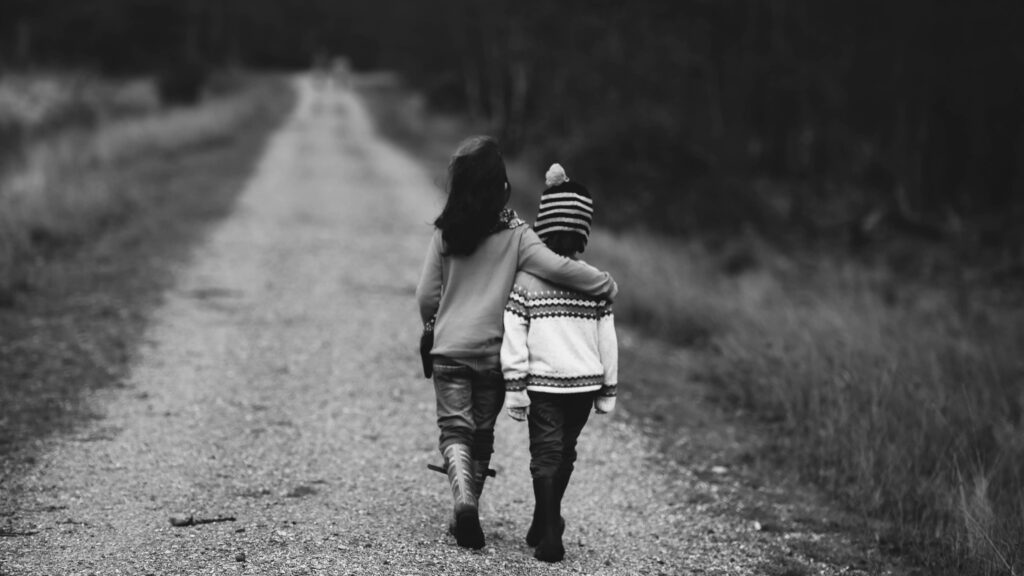

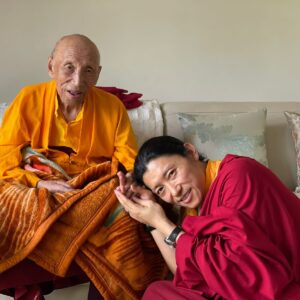
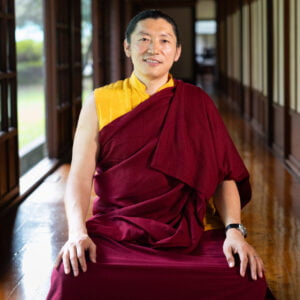
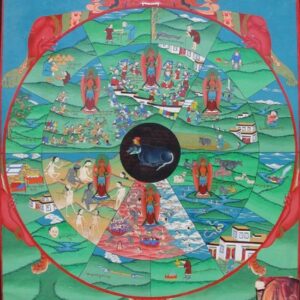
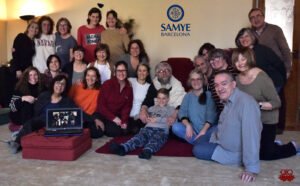
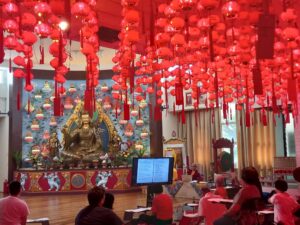
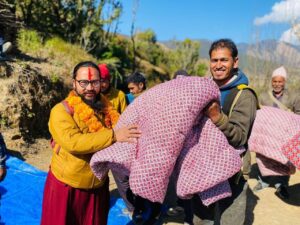
Responses